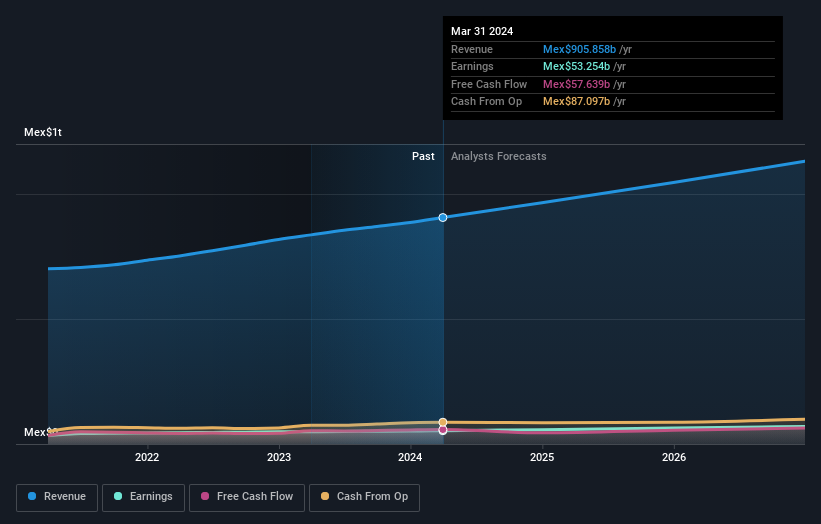- Mexico
- /
- Food and Staples Retail
- /
- BMV:WALMEX *
Public companies account for 71% of Wal-Mart de México, S.A.B. de C.V.'s (BMV:WALMEX) ownership, while individual investors account for 17%

Key Insights
- The considerable ownership by public companies in Wal-Mart de México. de indicates that they collectively have a greater say in management and business strategy
- The largest shareholder of the company is Walmart Inc. with a 71% stake
- Institutions own 12% of Wal-Mart de México. de
If you want to know who really controls Wal-Mart de México, S.A.B. de C.V. (BMV:WALMEX), then you'll have to look at the makeup of its share registry. The group holding the most number of shares in the company, around 71% to be precise, is public companies. In other words, the group stands to gain the most (or lose the most) from their investment into the company.
Meanwhile, individual investors make up 17% of the company’s shareholders.
Let's take a closer look to see what the different types of shareholders can tell us about Wal-Mart de México. de.
Check out our latest analysis for Wal-Mart de México. de

What Does The Institutional Ownership Tell Us About Wal-Mart de México. de?
Many institutions measure their performance against an index that approximates the local market. So they usually pay more attention to companies that are included in major indices.
As you can see, institutional investors have a fair amount of stake in Wal-Mart de México. de. This can indicate that the company has a certain degree of credibility in the investment community. However, it is best to be wary of relying on the supposed validation that comes with institutional investors. They too, get it wrong sometimes. When multiple institutions own a stock, there's always a risk that they are in a 'crowded trade'. When such a trade goes wrong, multiple parties may compete to sell stock fast. This risk is higher in a company without a history of growth. You can see Wal-Mart de México. de's historic earnings and revenue below, but keep in mind there's always more to the story.

Hedge funds don't have many shares in Wal-Mart de México. de. Our data shows that Walmart Inc. is the largest shareholder with 71% of shares outstanding. This implies that they have majority interest control of the future of the company. For context, the second largest shareholder holds about 2.5% of the shares outstanding, followed by an ownership of 1.3% by the third-largest shareholder.
While it makes sense to study institutional ownership data for a company, it also makes sense to study analyst sentiments to know which way the wind is blowing. There are plenty of analysts covering the stock, so it might be worth seeing what they are forecasting, too.
Insider Ownership Of Wal-Mart de México. de
While the precise definition of an insider can be subjective, almost everyone considers board members to be insiders. Management ultimately answers to the board. However, it is not uncommon for managers to be executive board members, especially if they are a founder or the CEO.
Insider ownership is positive when it signals leadership are thinking like the true owners of the company. However, high insider ownership can also give immense power to a small group within the company. This can be negative in some circumstances.
We note our data does not show any board members holding shares, personally. It is unusual not to have at least some personal holdings by board members, so our data might be flawed. A good next step would be to check how much the CEO is paid.
General Public Ownership
With a 17% ownership, the general public, mostly comprising of individual investors, have some degree of sway over Wal-Mart de México. de. While this size of ownership may not be enough to sway a policy decision in their favour, they can still make a collective impact on company policies.
Public Company Ownership
We can see that public companies hold 71% of the Wal-Mart de México. de shares on issue. This may be a strategic interest and the two companies may have related business interests. It could be that they have de-merged. This holding is probably worth investigating further.
Next Steps:
While it is well worth considering the different groups that own a company, there are other factors that are even more important. Consider for instance, the ever-present spectre of investment risk. We've identified 1 warning sign with Wal-Mart de México. de , and understanding them should be part of your investment process.
Ultimately the future is most important. You can access this free report on analyst forecasts for the company.
NB: Figures in this article are calculated using data from the last twelve months, which refer to the 12-month period ending on the last date of the month the financial statement is dated. This may not be consistent with full year annual report figures.
Valuation is complex, but we're here to simplify it.
Discover if Wal-Mart de México. de might be undervalued or overvalued with our detailed analysis, featuring fair value estimates, potential risks, dividends, insider trades, and its financial condition.
Access Free AnalysisHave feedback on this article? Concerned about the content? Get in touch with us directly. Alternatively, email editorial-team (at) simplywallst.com.
This article by Simply Wall St is general in nature. We provide commentary based on historical data and analyst forecasts only using an unbiased methodology and our articles are not intended to be financial advice. It does not constitute a recommendation to buy or sell any stock, and does not take account of your objectives, or your financial situation. We aim to bring you long-term focused analysis driven by fundamental data. Note that our analysis may not factor in the latest price-sensitive company announcements or qualitative material. Simply Wall St has no position in any stocks mentioned.
About BMV:WALMEX *
Wal-Mart de México. de
Owns and operates self-service stores in Mexico and Central America.
Solid track record with excellent balance sheet and pays a dividend.


